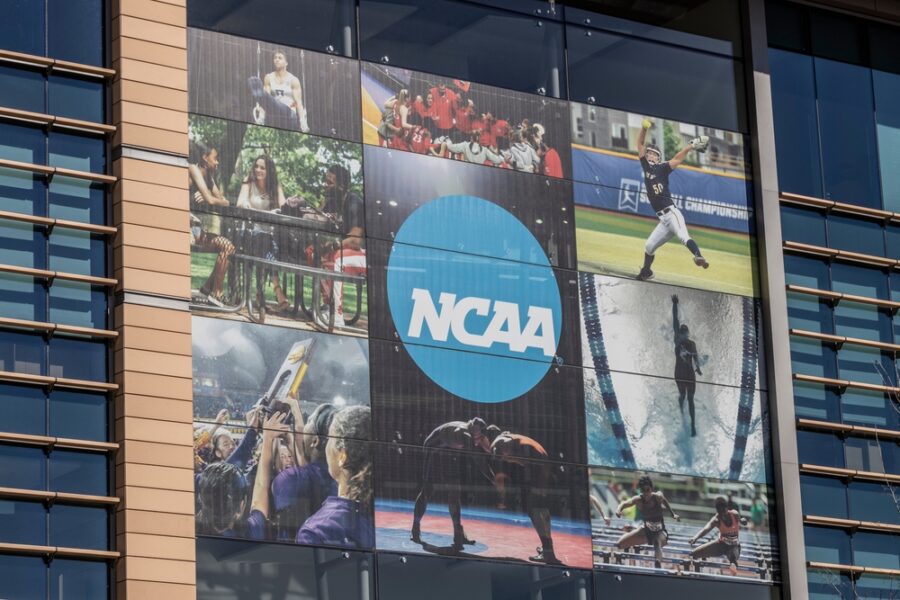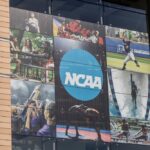NCAA rescinds decision to allow pro sports betting for college athletes and staff

The NCAA has reversed a recent decision that would have allowed student-athletes and athletic department staff to place bets on professional sports.
In October, the Division I and II Administrative Committees adopted legislation that would allow athletes to wager on games in the NFL, NBA, and MLB.
Initially, this was to take effect on 1 November, but a rarely used rule was invoked that allowed Division I colleges to reject the proposal if a two-thirds majority could be achieved.
On Friday, that benchmark was officially reached, meaning the rule change has been rescinded. It comes off the back of several gambling scandals that have swept through professional and collegiate sports in the US.
In recent weeks, federal authorities have arrested two Cleveland Guardians pitchers, Emmanuel Clase and Luis Ortiz, Portland Trail Blazers head coach Chauncey Billups, Miami Heat guard Terry Rozier, and former NBA journeyman Damon Jones.
All are alleged to have been involved in various illegal gambling operations.
On the college side, 14 players from seven different schools have been stripped of their eligibility or are under investigation for gambling-related activities.
Last week on Good Morning America, former University of New Orleans player Dae Dae Hunter admitted to his role in a point-shaving scheme, in which he intentionally missed shots.
Charlotte Capewell brings her passion for storytelling and expertise in writing, researching, and the gambling industry to every article she writes. Her specialties include the US gambling industry, regulator legislation, igaming, and more.
Verticals:
Sectors:
Topics:
Dig Deeper
The Backstory
Why the reversal happened now
The NCAA’s decision to rescind its short-lived move to let college athletes and athletic staff bet on professional sports was the culmination of a rapid, contested rulemaking process and a rare membership veto. After Division I and II administrative leaders approved the change in early October, the shift was slated to take effect Nov. 1. But Division I schools activated a seldom-used mechanism allowing a 30-day rescission window. When enough programs signaled opposition to meet the two-thirds threshold, the proposal collapsed and the previous, stricter prohibition snapped back into place.
The about-face underscores how quickly the political ground shifted once the plan moved from committee rooms to campuses. What looked like a technical modernization—aligning NCAA rules with a U.S. market where legal wagering has expanded—ran headlong into mounting integrity concerns and a flurry of high-profile gambling investigations. By the time the rescission tally was official, the policy’s legal logic had been overtaken by reputational risk.
How the push to modernize gathered steam
The reversal capped months of movement toward loosening betting restrictions that, for decades, barred athletes and staff from wagering on any sports. In April, the Division I Board signaled openness to change. By summer, the Division I Council formally recommended allowing athletes and staff to bet on pro sports while keeping college sports off limits, arguing the old rules were written when sports gambling was largely illegal. That stance was laid out in the council’s vote to recommend permitting pro wagering for Division I athletes and staff, with leaders emphasizing the policy would still ban college sports betting and information sharing. The council chair framed the shift as an update to a bygone era, not an endorsement of gambling, in the Division I Council recommendation.
Momentum continued into October. The Administrative Committee approved a proposal for Division I, with Divisions II and III set to weigh in later in the month. The case for change leaned on practical enforcement realities and parity with nonathlete students who can legally wager in many states. That pathway was described when the NCAA moved toward allowing pro-sports betting by athletes and staff. Within weeks, Divisions II and III management councils joined in, clearing the way for a Nov. 1 start and stressing harm-reduction education rather than blanket prohibition, according to the initial cross-division approvals.
Red flags and a growing pause
Even as approvals stacked up, dissent hardened. The Division I Board pushed the effective date back to Nov. 22 to run just beyond the rescission window, a sign the membership threshold for a smooth rollout was in doubt. The delay followed public concerns raised by powerful conference voices and came as law enforcement activity around sports betting accelerated. The NCAA’s postponement and the risk of a membership overturn were detailed when the association delayed the rule change. While the measure still would have barred gambling on college events and the sharing of insider information, the pause gave time for opposition to coalesce around the optics and operational risks of normalizing any betting by athletes.
The timing turned unfavorable. Federal probes nabbed professional coaches and players, and college investigations widened, amplifying the fear that an evolving betting ecosystem could bleed into amateur ranks. Administrators who initially viewed the pro-only exception as a manageable compromise came to see it as a line too hard to police and too easy to exploit, especially as point-shaving allegations resurfaced at smaller programs and social media harassment tied to betting markets surged.
Integrity pressures in a legal betting era
The NCAA’s retreat reflects a larger tension: legal wagering has rapidly normalized fan behavior and media coverage, but governance systems built for prohibition have struggled to adapt. Earlier in the year, three former Fresno State men’s basketball players received lifetime bans for betting on their own games, part of a string of enforcement actions cited when the association first advanced the proposal. Even as leaders argued for modernization, the integrity drumbeat grew louder.
The NCAA has tried to carve out risk-mitigation measures tailored to the college environment. One visible step: extending its data partnership with Genius Sports while barring sportsbooks from offering “negative” proposition bets that can fuel targeted abuse, as outlined in the update on protecting athletes from negative prop bets. The association pointed to research showing a spike in online harassment of student-athletes and a high prevalence of betting among 18–22-year-olds, making prop markets a flashpoint for bad behavior.
These measures, while incremental, signaled the NCAA’s preference for harm reduction over strict abstinence—at least until the latest scandals raised fresh questions about exposure. Once arrests and probes touched multiple leagues and headlines blended pro misconduct with college investigations, the political calculus changed. Allowing any betting by athletes, even on pro contests, became harder to defend amid fears of cross-contamination and the optics of loosening rules during an integrity crackdown.
What the retreat means and what to watch next
The rescission restores the blanket ban on athletes and staff wagering on pro or college sports. It also marks a setback for reformers who saw a pro-only carve-out as a pragmatic compromise aligned with state legalization. In the short term, the decision eases pressure on compliance departments wary of differentiating between permissible pro wagers and impermissible college bets, and it offers a clearer message to athletes navigating an omnipresent betting marketplace.
But the underlying drivers—legalization, ubiquitous mobile apps, and the blurred lines between fandom and finance—remain unresolved. The NCAA’s own data initiatives and its push to curtail certain bet types show that the association will keep seeking guardrails even within a stricter rule environment. Expect renewed emphasis on education, monitoring and cooperation with state regulators, along with continued advocacy to limit college-specific prop markets highlighted in the Genius Sports agreement.
Longer term, governance may hinge on whether campuses can demonstrate that bright-line bans are enforceable and fair in a landscape where peers can legally wager. The earlier rationale from reform advocates—articulated in the Division I Council’s recommendation—is unlikely to disappear. For now, however, integrity concerns and public perception have the upper hand. The NCAA has opted for caution, betting that a firmer stance will help stabilize college sports’ credibility as the legal wagering tide keeps rising.




